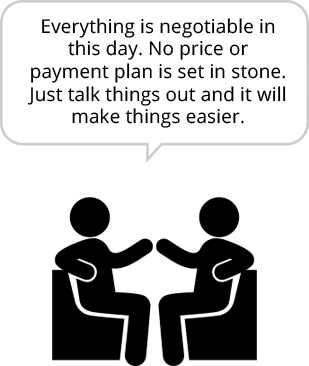
Learning how to ask for a debt settlement is all about knowing when to strike and how to ask for it. But, before you jump into negotiating your payment plan, you need to be equipped with all the knowledge you can gather. Showing that you know your stuff will not only show the creditor you mean business, but will also ensure that they treat you with respect, and abide by all guidelines and ethics.
What surprises most people is finding that, yes, you can cut the debt on your credit cards bills in half, if not more! That’s right. Under the right circumstances, and equipping yourself with the right knowledge, you can finally see a light at the end of the tunnel. If you are ready to say goodbye to financial burdens and finally start to gain control over your finances, follow our guidelines and tips for debt settlement and give yourself a fresh start today!

Here are the ways in which an attorney can help you with debt settlements:

While the pros of debt settlement are obvious-that you can potentially eliminate your monthly balance, lessen your debt, and give you your peace of mind back, there are some cons to consider. Before you attempt a settlement, make sure that you are fully aware of every angle, and that this is the right move for you.
First, remember that you are offering a large sum of money at once. If this is not laying around in a bank account, you need to consider the ways in which it will affect you and your family. Paying off a huge lump sum may cause some huge changes in the standard of living you are used to.
Secondly, debt settlements will usually show up on your credit report and lower your score. For the next few years, this will cause some difficulty if you try to secure any affordable new accounts or loans.
Negotiating 101
If you believe a consolidation is the right move for you, whether you decide to hire an attorney or go at it solo, you want to make sure it is apparent to the credit card company that you are in a truly dire situation. If they look at your statement and see expensive meals, vacations, and other purchases, it is likely they will not take mercy on your situation. Likewise, if they look into your history and see that you have been making minimum payments every month, they will be less likely to believe you’re going through financial troubles.
It is always a good idea to let your credit card company know when you fall behind financially and, if you are going to ask for a settlement, you need to cut all spending on your card at least three to six months beforehand.
When you’re ready to make your settlement, call your credit card company and ask to speak with someone in the settlement department. Once you are connected with the correct representative, explain your situation and explain that you are at your wit’s end.
Another key for when you set out to negotiate is to mention you want to at least pay off ONE of your accounts before the money is gone. Hearing that you are trying to get settlements on numerous accounts will make your lender more likely to give you a competitive offer.
Also, remember that your lender wants to hear a dollar amount for your offer. Propose a lump sum payment of around 30 percent of your balance. They will likely try to negotiate for a higher payment; however, if they ask for more than 50 percent of your balance, consider how that will affect your finances. If you can’t do that, consider offering a settlement to another company or saving up for that payment in the future.
Once you finalize any settlement plans, ALWAYS get the agreement in writing. This way, you will ensure that the company doesn’t claim to verbally agree with the settlement, and then turn you over to a collection agency. Make sure the agreement clearly states the nature of the settlement, from how much the total balance was and how much you are willing to pay.

Learning how to make saving money a regular practice, you will not only pay off your debts faster, but you will ensure good financial standing from here on out. Plus, saving money is easier than you think! Follow these simple steps and start saving money to pay off (and keep off) your debts today!
Open a Savings Account
First things first. To save money, you need to open a savings account. What helps a lot of families is to set up automatic transfers from their primary account to drop an allotted amount into their savings each month. Plan this around your paycheck so you never see that money. Also, it doesn’t have to be a huge amount. Determine how much you want to save each month, or from each paycheck, based on your income and immediate bills.
Put Any Extra Money Aside
Whether you receive a bonus at work, or find yourself with some extra cash, although it will be tempting to spend it on a weekend getaway or new tech gadget, instead, put it in your savings account or emergency fund.
Sell Unwanted Items
Host a yard sale, sell items on Craigslist or eBay. This can be anything that is in good condition that you don’t use, such as clothes, appliances, furniture.
Bring Your Lunch to Work
This will save you tons. If you always eat out for lunch at work, start prepping meals at home, and bring them to the office. This is such an unnecessary expense that takes up a hefty amount of your monthly budget.
Save $20 Off Your Grocery Bill
This is an easy way to spend less monthly, while at the same time it’s not too extreme. Spending just 20 dollars less each week or month will help you save anywhere from 200 – 1,000 dollars! Do this by cutting out sodas, snacks, sweets, or anything else that isn’t necessary.
Cut Out To-Go Coffees
Along with those lunches out, grabbing lattes on the way to work sucks the money right out of your account. With prices nearing (or exceeding) five dollars per cup, you will be able to save immensely if you start making your coffee at home.
Get Rid of Memberships
Gym memberships usually have high monthly fees. Cut out those, and all other memberships you don’t need, especially if you don’t use them.
Stop All Subscriptions
Along with those memberships, stop all magazine or newspaper expenses. They may not be expensive, but they do add up. Use that money for more important items!
Seasonal Part-Time Job
If you’re able to, pick up a seasonal job and put those earnings toward savings. Tons of companies and businesses need the extra help around the holidays, and you’ll be able to make quick cash.
Use Your Talents to Make Extra Cash
If you’re artsy, maybe you are fluent in another language, or perhaps you love children, put those talents to good use! Offer to babysit for friends or family, walk the neighbor’s dogs, or tutor a student in a foreign language. These are great ways to make extra earnings, and you’re able to easily put those toward savings!
Collect Loose Change
Piggy banks aren’t just for kids! Each day, throw your loose change into a jar, and watch the money add up. You’ll be amazed at how much money you’ll collect at the end of each month! Deposit those savings into your account, or keep the cash in the house for emergencies.

These bad habits will get you in trouble, time after time. After planning and going through with your debt consolidation, strive to improve your financial status by recognizing your bad habits and getting rid of them ASAP!
when you can’t afford it





